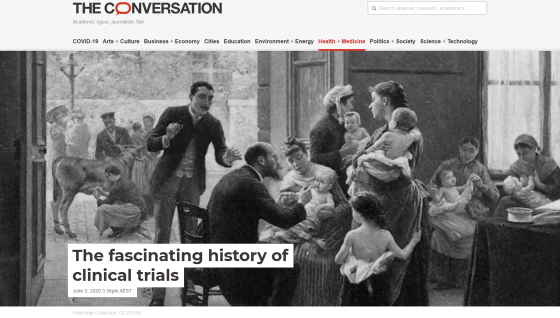What is the history of “clinical trials” that have evolved over the centuries?

A
The fascinating history of clinical trials
https://theconversation.com/the-fascinating-history-of-clinical-trials-139666

◆ 1: Test of '
One of the earliest clinical studies is an experiment conducted in China about 1000 years ago. 1061 to the year the Northern Song Dynasty was a scientist-Chancellor of Su Song has edited ' Materia Medica view through the book that', has been written about the clinical trials carried out on ginseng medicinal.
According to the description of the Sutra, two people were chosen to study the effects of ginseng, one with ginseng and the other with nothing. After that, when two people ran for 1500m to 2500m, those who did not eat ginseng suffered severe shortness of breath, but those who ate ginseng could breathe smoothly.
This case is the world's first record of an experiment conducted with an untreated control group, and the presence of an untreated or placebo- controlled group in modern clinical studies is very important. Has become. In addition, research on the medicinal effect of ginseng has been conducted in modern times, and a 2018 study revealed that ginseng is effective in treating erectile dysfunction (ED).

by
◆2:Test of ' rhubarb ' held in 18th century England
Rhubarb is a plant that has been used as a laxative since BC, and in the 18th century England, rhubarb produced in various places in the world, such as from England and Turkey, was in circulation. So, a doctor called Caleb Parry , who lived in the UK, conducted a study to examine whether there is a difference in the effect as a laxative between 'cheap rhubarb from England' and 'expensive rhubarb from Turkey'. ..
In a study conducted by Parry in 1786, Parry regularly switched the types of rhubarb given to patients, and measured how different the effects were for each type. As a result, Parry concluded that 'there is no advantage in using expensive Turkish rhubarb.' Rhubarb is rich in anthraquinone derivatives that act as a laxative, so it seems that it is actually effective as a laxative.

◆ 3: Randomized comparative study on the prevention of ' Beriberi ' in the early 20th century
In Asia during the 19th and early 20th centuries there were many patients with beriberi, and in Japan there were many patients with beriberi in Edo, where white rice was prevalent, so it was called “Edo suffering”. Beriberi, which causes decreased cardiac function and neuropathy, is a potentially fatal disease, and its treatment and prevention was a major focus for the Asian medical community.
During the 1905 epidemic in a mental hospital in Kuala Lumpur , William Fletcher, a surgeon in the region, conducted an experiment on beriberi prevention. Fletcher assigned a number to each patient and divided the wards into one ward, and he gave a brown rice diet in one ward and a white rice diet in the other ward and observed the progress. At the end of the experiment, 15% of the patients fed the white rice diet died of beriberi, and none of the patients fed the brown rice diet died, confirming the effectiveness of the brown rice diet.
Fletcher's experiment, which is problematic in modern ethics, is one of the first clinical trials to randomly select and compare patients. Even in modern clinical trials, randomly selecting and comparing patients is important for improving the accuracy of clinical trials. In addition, at the time of writing the article, it is known that severe and chronic deficiency of vitamin B1 (thiamine) is the cause of beriberi, and brown rice food is known to supplement vitamin B1 and beriberi effective.

◆ 4: Tuberculosis and double-blind randomized controlled trial
In 1948, Austin Bradford Hill, also known as an epidemiologist and statistician, conducted the world's first randomized controlled trial to study treatments for tuberculosis. Bradford Hill used a random number table to screen patients and decide whether to treat with the antibiotic streptomycin or without streptomycin.
Bradford Hill also did not inform the treating doctor 'which patient is receiving streptomycin,' nor did he inform the patient that he was in a clinical trial. In this way, the method in which both the doctor in charge of the study and the patient do not know the details of treatment is called 'double-blind method' and has the implication of preventing symptom improvement and observer bias due to the placebo effect.
At the time of writing the article, randomized controlled trials using a double-blind method were generalized to test new therapeutic agents, but the path to that point was very long, Professor Esterman said. It was

Related Posts:
in Science, Posted by log1h_ik







